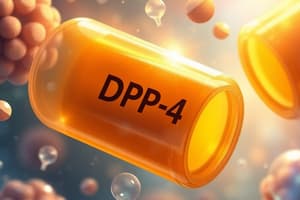Podcast
Questions and Answers
What is a common symptom associated with the Tenchhoff catheter?
What is a common symptom associated with the Tenchhoff catheter?
- Headache and dizziness
- Fever and tenderness (correct)
- Shortness of breath
- Nausea and vomiting
How long does the abdominal pain typically last after using the Tenchhoff catheter?
How long does the abdominal pain typically last after using the Tenchhoff catheter?
- Over a week
- 1-2 days
- 3-8 hours (correct)
- Less than 1 hour
What is a key indicator that a patient with a Tenchhoff catheter may have peritonitis?
What is a key indicator that a patient with a Tenchhoff catheter may have peritonitis?
- Decreased abdominal pain
- Excess fluids in the abdomen (correct)
- No fever present
- Reduced tenderness
What is the main mechanism of action of sulfonylureas like glipizide and glyburide?
What is the main mechanism of action of sulfonylureas like glipizide and glyburide?
What is an important action to take if a patient with a Tenchhoff catheter experiences cloudy dialysate?
What is an important action to take if a patient with a Tenchhoff catheter experiences cloudy dialysate?
What is a common side effect associated with insulin pumps?
What is a common side effect associated with insulin pumps?
How should clothing be managed around the access site of a Tenchhoff catheter to prevent complications?
How should clothing be managed around the access site of a Tenchhoff catheter to prevent complications?
Which medication is specifically mentioned for the prevention of hepatic glucose production?
Which medication is specifically mentioned for the prevention of hepatic glucose production?
Why is administering insulin at 2-3 AM not recommended?
Why is administering insulin at 2-3 AM not recommended?
What is the primary goal when managing hyperglycemia according to the text?
What is the primary goal when managing hyperglycemia according to the text?
What is the primary cause of hypoglycemia in a patient with diabetes mellitus receiving insulin?
What is the primary cause of hypoglycemia in a patient with diabetes mellitus receiving insulin?
What is the recommended immediate treatment for hypoglycemia caused by excessive insulin administration?
What is the recommended immediate treatment for hypoglycemia caused by excessive insulin administration?
What is the best approach to manage hyperglycemic hyperosmolar state in a patient?
What is the best approach to manage hyperglycemic hyperosmolar state in a patient?
How can the Somogyi phenomenon be effectively prevented in a patient on insulin therapy?
How can the Somogyi phenomenon be effectively prevented in a patient on insulin therapy?
What is the recommended management for metabolic acidosis in a patient with diabetes receiving insulin?
What is the recommended management for metabolic acidosis in a patient with diabetes receiving insulin?
Which symptom is NOT typically associated with hyperglycemia in diabetic patients?
Which symptom is NOT typically associated with hyperglycemia in diabetic patients?
What is the most common cause of nosocomial infection mentioned in the text?
What is the most common cause of nosocomial infection mentioned in the text?
Which term is used to describe a 'burning pain' in the context provided?
Which term is used to describe a 'burning pain' in the context provided?
What is a common symptom associated with CAUTI as per the text?
What is a common symptom associated with CAUTI as per the text?
What is the potential consequence of having an 'ascending infection'?
What is the potential consequence of having an 'ascending infection'?
Which factor mentioned in the text contributes to urinary stasis and its associated risks?
Which factor mentioned in the text contributes to urinary stasis and its associated risks?
What is a common medication mentioned in the text for Urinary Tract Infections (UTIs)?
What is a common medication mentioned in the text for Urinary Tract Infections (UTIs)?
What is the best indicator for fluid baseline data monitoring in the general management of patients?
What is the best indicator for fluid baseline data monitoring in the general management of patients?
Which electrolyte imbalance is associated with the risk of dysrhythmias as mentioned in the text?
Which electrolyte imbalance is associated with the risk of dysrhythmias as mentioned in the text?
Which medication is used as a phosphate binder in the management of patients with electrolyte imbalances?
Which medication is used as a phosphate binder in the management of patients with electrolyte imbalances?
What is the primary effect of Epoetin (Epogen) mentioned in the text?
What is the primary effect of Epoetin (Epogen) mentioned in the text?
Which process involves the movement of solutes from an area of higher concentration to lower concentration as described in the text?
Which process involves the movement of solutes from an area of higher concentration to lower concentration as described in the text?
In hemodialysis, what does the dialyzer primarily cleanse from the blood?
In hemodialysis, what does the dialyzer primarily cleanse from the blood?
Flashcards
Tenchhoff catheter symptom
Tenchhoff catheter symptom
Fever and tenderness are common symptoms associated with a Tenchhoff catheter.
Abdominal pain duration (Tenchhoff)
Abdominal pain duration (Tenchhoff)
Abdominal pain after a Tenchhoff catheter typically lasts 3-8 hours.
Peritonitis indicator (Tenchhoff)
Peritonitis indicator (Tenchhoff)
Excess abdominal fluids are a key indicator of peritonitis in a patient with a Tenchhoff catheter.
Sulfonylureas mechanism
Sulfonylureas mechanism
Signup and view all the flashcards
Cloudy dialysate action
Cloudy dialysate action
Signup and view all the flashcards
Insulin pump side effect
Insulin pump side effect
Signup and view all the flashcards
Tenchhoff catheter clothing
Tenchhoff catheter clothing
Signup and view all the flashcards
Hepatic glucose prevention
Hepatic glucose prevention
Signup and view all the flashcards
Late-night insulin timing
Late-night insulin timing
Signup and view all the flashcards
Hyperglycemia management goal
Hyperglycemia management goal
Signup and view all the flashcards
Hypoglycemia cause
Hypoglycemia cause
Signup and view all the flashcards
Hypoglycemia treatment
Hypoglycemia treatment
Signup and view all the flashcards
Hyperosmolar state treatment
Hyperosmolar state treatment
Signup and view all the flashcards
Somogyi prevention
Somogyi prevention
Signup and view all the flashcards
Metabolic acidosis treatment
Metabolic acidosis treatment
Signup and view all the flashcards
Hyperglycemia NON symptom
Hyperglycemia NON symptom
Signup and view all the flashcards
Nosocomial infection cause
Nosocomial infection cause
Signup and view all the flashcards
Burning pain symptom
Burning pain symptom
Signup and view all the flashcards
CAUTI symptom
CAUTI symptom
Signup and view all the flashcards
Ascending infection consequence
Ascending infection consequence
Signup and view all the flashcards
Urinary stasis factor
Urinary stasis factor
Signup and view all the flashcards
UTI medication
UTI medication
Signup and view all the flashcards
Fluid baseline data
Fluid baseline data
Signup and view all the flashcards
Electrolyte imbalance & dysrhythmias
Electrolyte imbalance & dysrhythmias
Signup and view all the flashcards
Phosphate binder
Phosphate binder
Signup and view all the flashcards
Epoetin effect
Epoetin effect
Signup and view all the flashcards
Diffusion process
Diffusion process
Signup and view all the flashcards
Dialyzer function
Dialyzer function
Signup and view all the flashcards
Study Notes
Diabetes Management
- Oral Hypoglycemic Agents (OHAs) stimulate insulin production and increase insulin binding to cell receptors
- Sulfonylureas (e.g., tolbutamide, glipizide, glyburide) stimulate insulin secretion and increase insulin binding to cell receptors
- Biguanides (e.g., metformin) prevent hepatic glucose production and increase glucose transport into cells
Insulin Administration
- Insulin pumps: external devices that deliver insulin continuously via a catheter
- Insulin injection sites: rotate sites to prevent lipodystrophy and insulin resistance
- Insulin dosage: adjust based on blood glucose levels and carbohydrate intake
Hypoglycemia (Low Blood Sugar)
- Symptoms: trembling, anxiety, tachycardia, sweating, hunger, and dizziness
- Causes: insulin overdose, skipped meals, excessive exercise, and certain medications
- Treatment: administer fast-acting carbohydrates (e.g., glucose tablets, juice, or hard candies)
Hyperglycemia (High Blood Sugar)
- Symptoms: polyuria, polydipsia, polyphagia, and blurred vision
- Causes: insulin deficiency, infection, and certain medications
- Complications: diabetic ketoacidosis, hyperglycemic hyperosmolar non-ketotic syndrome, and hypoglycemia
Diabetic Foot Care
- Prevent foot ulcers: inspect feet daily, wear well-fitting shoes, and manage calluses and corns
- Manage foot infections: use antibiotics, debride wounds, and practice good wound care
Renal Failure
- Causes: diabetic nephropathy, hypertension, and kidney disease
- Symptoms: uremia, edema, and fatigue
- Treatment: dialysis, kidney transplantation, and management of underlying conditions
Peritoneal Dialysis
- Uses a catheter to filter waste from the blood
- Requires frequent exchanges of dialysate solution
- Complications: peritonitis, infection, and catheter malfunction
Studying That Suits You
Use AI to generate personalized quizzes and flashcards to suit your learning preferences.





